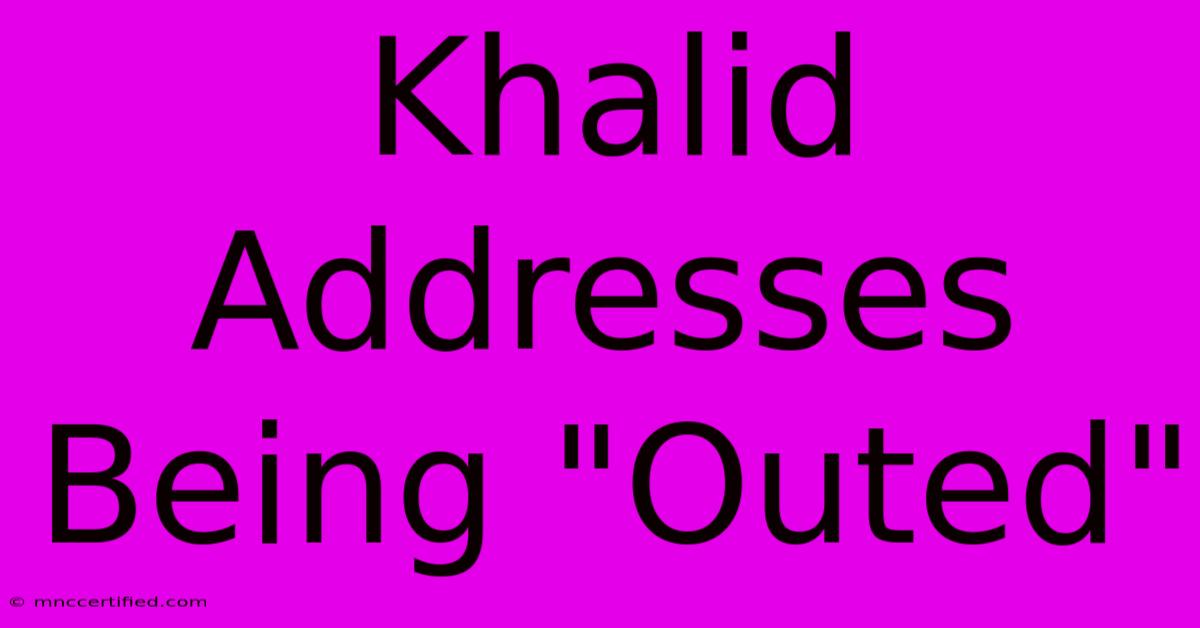Khalid Addresses Being "Outed"

Table of Contents
Khalid Addresses Being "Outed": A Deeper Dive into Privacy, Sexuality, and Public Image
Singer Khalid recently addressed the experience of being "outed," sparking important conversations about privacy, sexuality, and the pressures faced by public figures. This event highlights the complexities of navigating a personal life in the spotlight and the evolving relationship between celebrities and their fans. This article delves into Khalid's statement, exploring the implications for both the artist and the broader discourse surrounding celebrity and LGBTQ+ representation.
The Public "Outing" and its Aftermath
Khalid, known for his introspective music and relatable lyrics, found himself unexpectedly thrust into a public discussion about his sexuality. While he has always maintained a degree of privacy regarding his personal life, information about his sexual orientation was shared without his consent, a situation many refer to as being "outed." His subsequent response, while brief, was powerful and demonstrated his agency in controlling his narrative. He directly addressed the situation, confirming aspects of his personal life while simultaneously emphasizing the importance of respecting individual boundaries and privacy.
The Importance of Consent and Respect for Privacy
Khalid's experience underscores a crucial point: everyone, regardless of their public persona, deserves to control their own narrative and decide when and how to share personal information. Being "outed" is a violation of privacy, and it can be deeply hurtful and damaging. This highlights the ethical responsibility of media outlets and fans alike to respect individuals' privacy and avoid sharing sensitive information without consent. The online world, especially, demands heightened awareness of the potential consequences of impulsive sharing and the impact it can have on individuals.
Navigating Sexuality in the Public Eye
For public figures, particularly those in the entertainment industry, navigating personal matters in the public eye is a constant challenge. The pressure to conform to societal expectations or reveal aspects of their lives can be immense. Khalid's response, focusing on his own terms and timeline, serves as an example of reclaiming personal narrative in the face of unwanted exposure.
Authenticity vs. Public Perception
The balance between authenticity and protecting one's privacy is a delicate one. Celebrities often walk a tightrope, striving to connect with fans on a personal level while also safeguarding their personal lives. Khalid's situation underscores the inherent tension between these two desires and the challenges in maintaining control over one's public image.
The Broader Conversation: LGBTQ+ Representation and Acceptance
Beyond Khalid's personal experience, this event contributes to the ongoing conversation about LGBTQ+ representation in the media and the importance of fostering an accepting and inclusive society. While increased visibility of LGBTQ+ individuals in the public sphere is vital for progress, it's equally crucial to respect individual boundaries and allow individuals to share their stories on their own terms.
The Power of Openness and the Importance of Respect
Openly discussing sexuality can be empowering, but it's not an obligation. Khalid's approach demonstrates that there is no single "right" way to navigate one's identity in the public sphere. The focus should be on fostering a culture of respect, empathy, and understanding where everyone feels comfortable and safe sharing information at their own pace.
Conclusion: Learning from Khalid's Experience
Khalid's response to being "outed" offers a valuable lesson for both celebrities and the public. It reinforces the importance of respecting personal boundaries, protecting privacy, and allowing individuals to control their own narrative. His actions encourage a more thoughtful and empathetic approach to discussions surrounding sexuality and public image, contributing to a healthier and more inclusive environment for everyone. This event serves as a powerful reminder of the need to prioritize consent, respect, and individual autonomy in the digital age.

Thank you for visiting our website wich cover about Khalid Addresses Being "Outed". We hope the information provided has been useful to you. Feel free to contact us if you have any questions or need further assistance. See you next time and dont miss to bookmark.
Featured Posts
-
Life Insurance Seattle Washington
Nov 23, 2024
-
Univista Insurance Franchise Cost
Nov 23, 2024
-
Khalid Responds To Being Outed
Nov 23, 2024
-
West Coast Braces For Bomb Cyclone
Nov 23, 2024
-
Bondi Trumps New Attorney General Pick
Nov 23, 2024